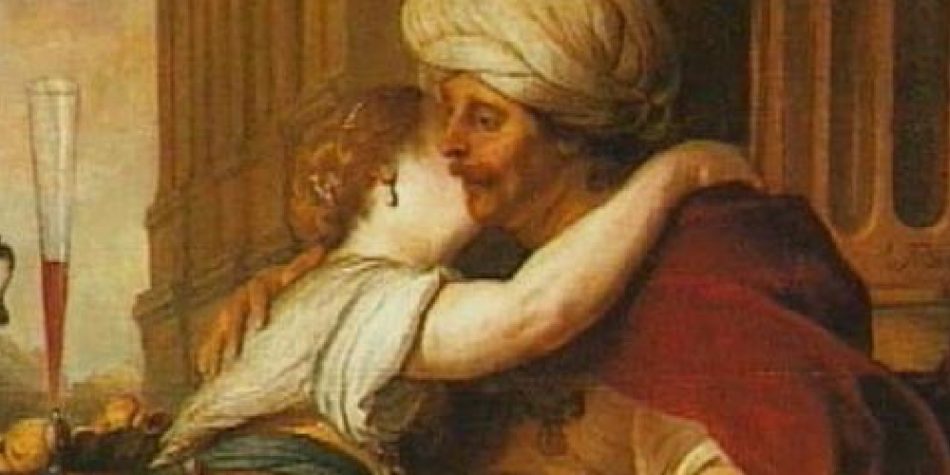The story of David and Bathsheba has preoccupied readers of the Hebrew Bible for centuries. It has all the makings of a Hollywood production and yet it is a narrative that is relatable and compellingly human. Though the Chronicler seeks to clean up the story of Solomon’s birth by omitting discussion about Uriah and Bathsheba completely (see 1 Chronicles 20), 2 Samuel 11-12 lays out the facts in devastating detail: it is a story of the self-destruction of God’s anointed. It is also a disturbing narrative that explores heavy, painful, and uncomfortable themes—which, in my view, is exactly why it belongs in our sacred text and is worthy of our continued focus. And, like many stories in the Hebrew Bible, there are a variety of ways in which it can be read and numerous lessons which can be applied.
In my experience attending The Church of Jesus Christ of Latter-day Saints, the David and Bathsheba story has been primarily discussed within the context of sexual morality. The salacious nature affair and the intrigue of the ensuing cover-up lend themselves to this reading. Whether it’s seen as a warning against extra-marital sexual relations, a caution against impure thoughts, or an example of what happens when you are in the wrong place at the wrong time, church lessons taught me (and probably many others) to see this David’s action as a violation of what we call the Law of Chastity. In fact, the June 2022 lesson material for the Church’s Come, Follow Me section covering this story has this same focus. Taking nothing away from this important emphasis, the prophet Nathan offered an additional way to understand why David’s actions were wrong, and it is one that I think is instructive for all of us. But before we get to Nathan’s prophetic response to what David did, let me outline two important facets of the Hebrew Bible that will help contextualize what Nathan says.
First, central to the commands that God gives Israel on Mount Sinai (which are included in the Torah) is the requirement to pursue justice. In multiple ways, and in a variety of different contexts, the Torah makes clear that individuals who are part of God’s Torah-guided community are not supposed to exploit, take advantage of, cheat, deceive, or mistreat other members of the community (including the “strangers” who live among them but who are not Israelites). A life lived according to the Torah requires avoiding unjust actions. Further, the Torah requires Israelites to proactively care for those who are disadvantaged (the widows, the orphans, the resident aliens, the poor, etc.) through actions like forgiving loans, providing the necessities of life, and redeeming property that had been sold or freeing Israelites in debt bondage. A life lived according to the Torah requires that members of the community seek to act justly. So, alongside the detailed ritual obligations (like which kinds of sacrifices to offer and when), the Torah outlines remarkably powerful social obligations that require the community to take care of each other and to pursue communal flourishing (even at the expense of self-interest—see Note #1). As one good, concrete example consider Boaz’s actions toward Naomi and Ruth. Boaz is representative of what an ideal, Torah-centered life looks like: Boaz both avoids exploiting Naomi and Ruth’s situation for his own gain and proactively provides for their well-being despite the fact that Ruth is from Moab and even though Boaz had to expend his own resources. On a deeper level, there is also clearly a lesson about the damage that follows when the powerful exploit the vulnerable.
With this backdrop, we can return to Nathan’s reaction to David’s actions. After learning that David had taken Bathsheba and tried to cover up his indiscretion, eventually having Uriah killed, the LORD sent Nathan to deliver a message. Here is a version of that exchange which I have recrafted in more modern language to emphasize the core message of 2 Samuel 12:1-13).
Speaking to David, the prophet Nathan says something like:
David, listen to this: There were two men living in the same city; one was rich and the other poor. The rich man had many, many animals … multiple flocks and herds in fact. The poor man had nothing except one little ewe lamb. The poor man had raised and cared for this lamb since it was a baby; the lamb grew up alongside his own children and even ate his food and drank out of his own cup. The poor man loved the lamb so much that it was considered part of the family. Well, one day a traveler came to visit the rich man. The rich man wanted to host the traveler but did not want to use one of his own animals to feed him, so instead, he took the poor man’s lamb and killed it, and fed it to the traveler.
David responds to Nathan with obvious anger and indignation:
As the Lord liveth, the rich man that did this should be put to death! What’s more, he should restore the poor man fourfold because of his callous and pitiless actions.
Nathan then responds to David accusingly:
You are the rich man! Thus saith the Lord God of Israel: I anointed you king and I saved you when Saul tried to kill you. I gave you all that Saul had, including his wives. I made you king over all of Israel and Judah … and if you had wanted more and asked for it, I would have given it to you. Why, then, did you despise Me and do evil? You had Uriah the Hittite killed with a sword and have taken his wife to be your wife. Because of this, your family will be afflicted with violence and internal strife. You tried to hide what you did, but all of Israel will see what happens to you now.
David ultimately acknowledges to Nathan: “I have sinned against the Lord.”
So, what is the lesson here? As noted at the outset, there is clearly a lesson in this narrative about the law of chastity. Setting aside the issues of David’s multiple wives and concubines (see Jacob 2:23-24 and D&C 132:38-39 which each discuss this), because Bathsheba was married David violated clear prohibitions against adultery. But I think Nathan’s response to David points to additional lessons. On one level, this revelatory condemnation focuses on how Uriah was treated. For most of the critical parts of the narrative, Uriah is absent and thus unable to protect his family. While Uriah was a way serving as a soldier in David’s army, David “took” Uriah’s wife for himself (it is the same verb in Hebrew as the one used in 1 Samuel 8 referenced above, laqach) and there was nothing Uriah could do about it. Even when called back from battle, Uriah’s adherence to tradition and his sense of loyalty stand in stark contest to David’s deceit (2 Samuel 11:8-13). To be clear, David’s taking of Bathsheba was not because David needed another wife—at this point in the story it is unclear how many wives and concubines David actually had (see 2 Samuel 3:2-5 and 2 Samuel 5:13), but he probably a lot of them— rather, it was because David simply wanted Bathsheba for himself. Like the rich man in Nathan’s story, David wanted something that someone else had, and like the rich man, David had the means to take it. So, he did. So not only was this act a violation of Uriah’s marriage, but it was also contrary to David’s Torah obligations.
On another, and I think deeper level, there is also clearly a lesson about the damage that follows when the powerful (socially, culturally, economically, politically, and institutionally) exploit the vulnerable. And, of all the people caught up in the story, Bathsheba was the most vulnerable and the one with the least social power. This is clear in a few ways. For example, Bathsheba is introduced in the narrative as, simply, “a woman” (2 Samuel 11:2). So, as the story opens, Bathsheba is a nameless woman that is cast as a mere object of King David’s desire. It is a few verses later, only after David has taken an interest in her, that we learn her name. But even when we learn her name, she is not just “Bathsheba,” rather she is Bathsheba “the daughter of Eliam, the wife of Uriah the Hittite” (2 Samuel 11:3)—her identity is not hers alone, but instead she is expressly bound to two different men (this is not unique to Bathsheba; with some rare exceptions women of that time were often regarded as little more than property). Further, her marriage to a Hittite (not an Israelite) could have also put her in a position of having even less social standing. All of this to say, Bathsheba was vulnerable to being exploited. She is like the “little ewe lamb” in Nathan’s story. And exploited she was. Like the lamb taken by the rich man, there is no indication that Bathsheba had any choice in the matter when “David sent messengers” to her home (2 Samuel 11:4). As scriptures say, David simply “took” (again, laqach) Bathsheba (2 Samuel 11:4). When the king calls, you go. And perhaps the most painful part of the whole story—and the part that most reveals the deep exploitation inherent in this story—is that, after David “lay[s] with her,” the narrative makes clear that David was not affected by this affair because “she was purified from her uncleanness” (2 Samuel 11:4). Said another way, the narrative makes sure we all understand David was all clear of ritual impurity because Bathsheba had bathed herself appropriately (see Leviticus 15:19-28). Like the lamb (who never has a voice in Nathan’s oracle and whose view of the actions taken against it are never considered), there is no attempt to consider Bathsheba’s perspectives or feelings on what happened to her at all. But, make no mistake about it, damage was done.
Thus, Nathan seems to be teaching David that a central part of David’s sin was that David abused his power and exploited the very people he should have been protecting. Nathan helped David see that the way he had acted toward Uriah and Bathsheba was exactly contrary to how the Torah says he should have acted. Uriah, one of David’s soldiers, was faithfully serving David. Yet rather than treating Uriah justly, David took advantage of Uriah’s absence to take Bathsheba. And Bathsheba, one of David’s subjects, was potentially vulnerable due to her husband’s absence. Yet rather than provide protection for Bathsheba, David exploited that vulnerability for his own pleasure. In taking these actions, David did exactly what Samuel warned the Israelites that kings would do: he took what he wanted in direct contradiction to what the Torah demanded of adherents. So, yes, on one level this story is about the Law of Chastity, but it is also about our responsibility to live justly. And for Nathan, it seems, David’s lack of justice seems to be the more serious problem. David abused his power and exploited the very people he should have been protecting.
The kind of life David should have lived, and the life we have been called to live as Jesus’s followers is one in which this kind of exploitation does not exist, and inequities are remedied. In fact, part of what makes a Zion community is the eradication of such exploitation. Consider the description of the Nephites following Jesus’s visit: “Every [person] did deal justly one with another. And they had all things common among them; therefore there were not rich and poor, bond and free, but they were all made free, and partakers of the heavenly gift” (4 Nephi 1: 2-3). Similarly, in the City of Enoch, “they were of one heart and one mind, and dwelt in righteousness; and there was no poor among them” (Moses 7:18). In both of these cases, true Christian living is characterized by a lack of exploitation and proactively correcting any inequality that may have existed. In short, they lived as the prophet Micah said they should: “to do justly, and to love mercy, and to walk humbly with thy God” (Micah 6:8). Nathan’s challenge to David is as pertinent now as it was more than two millennia ago. I hope we can all take it to heart.
Notes:
1. For a book-length discussion of this topic see Jeremiah Unterman, Justice for All, How the Jewish Bible Revolutionary Ethics, 2017 (Jewish Publication Society: Philadelphia, PA).
2. Yet, even after hearing this, the people said, “we will have a king over us; that we also may be like all the nations; and that our king may judge us, and go out before us, and fight our battles.”















